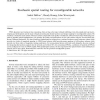Free Online Productivity Tools
i2Speak
i2Symbol
i2OCR
iTex2Img
iWeb2Print
iWeb2Shot
i2Type
iPdf2Split
iPdf2Merge
i2Bopomofo
i2Arabic
i2Style
i2Image
i2PDF
iLatex2Rtf
Sci2ools
MAM
2006
2006
Stochastic spatial routing for reconfigurable networks
FPGA placement and routing is time consuming, often serving as the major obstacle inhibiting a fast edit-compile-test loop in prototyping and development and the major obstacle preventing late-bound hardware and design mapping for reconfigurable systems. We introduce a stochastic search scheme which can achieve comparable route quality to traditional, software-based routers while being amenable to parallel, spatial implementation. We quantify the quality and performance of this route scheme using the Toronto Place-andRoute Challenge benchmarks. We sketch hardware implementations ranging from a minimal hardware-search assistance scheme which provides two orders of magnitude speedup, to FPGA-based schemes which provide greater speedup, to full hardware schemes which provide over three orders of magnitude routing acceleration. For coarse-grained devices with wide-word datapaths, the area overhead for integrating this hardware support into the network can be below 30%; for conventional FP...
| Added | 14 Dec 2010 |
| Updated | 14 Dec 2010 |
| Type | Journal |
| Year | 2006 |
| Where | MAM |
| Authors | André DeHon, Randy Huang, John Wawrzynek |
Comments (0)

